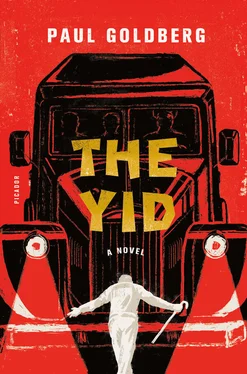Undoubtedly, this path of change would make Kogan cringe, for it represents a journey from one form of pathology to another, a psychiatric equivalent of the nasty mutations he can so adeptly identify with his microscope. (He has a lab and is interested in pathology.)
Kogan is subtly didactic in his treatment plan. The ski outings and poetry are intended to allow the patient to abandon fear of her feelings, particularly grief. Surely, he knows that his attention will inevitably lead Kima to sexualize their relationship. A polite, firm rejection is intended to illustrate that his attention to her is not a form of courtship and will continue, just as it did before, without sex.
Now Kogan is holed up in his house, staying out of sight, and Kima takes her ski runs alone, usually alongside the gorge. There is no more poetry. She is counting trains, observing them, like the martyred Zoya observed the Nazi troops in the forests around Moscow.
She has heard and watched them come for weeks, a freight train every hour, maybe more, usually heading toward Moscow, rarely back. She knows those trains from the inside. She has been cargo time and time again. Now, they are back, to take away … She learned that concept in 1937, the night they took her father.
His image is now dim: thick glasses beneath a karakul hat, a leather overcoat.
Night. Strangers in the house. A slap across his face, his broken glasses. A woman screaming. Her mother. Then, hours alone in a small room. A pantry? She thinks she drew snakes on walls. It was dark. Drawing with fervor, her life at stake. A song was the last thing she heard. In a language she would later recognize as Germanic, it projected pain, condemnation, power. Was this her father’s final message to her? How would she recognize that song again?
When the door opened, her father was gone. No farewell. His books, his papers, gone. Mother collapsed on a settee. The wood on it was red. She would never see such wood again. A big, overheated hand on her small back …
Is this a fantasy? Did this happen? Maybe. Why now the tears? She knows how to hold back that sort of thing. To live this life, you can’t have tears. Never a sob, not even when she found her mother’s corpse four years later, with half a face. No tears while reading the blood-soaked, typed note. One sentence was about “unbearable remorse for having borne an enemy’s child.” She begged the state to raise her daughter. The suicide note was a carbon copy. There was no gun and no typewriter.
If they have killed your parents and raised you like a cub, it may be better to find a way to set it all aside, to pack it, seal it, and throw it in the river, or snakes will eat your guts.
* * *
Oleg Butusov, a night guard, spends much of the early morning of February 25 on the steps of the dry goods store near the kolkhoz market.
It’s unclear what he is guarding, from whom, and why. But being a night guard is sacred work, for it gives men like Butusov a purpose in life and a reason to consider themselves guardians of order and superiors to the average passersby.
While it is impossible to determine with certainty what Butusov is doing in front of the kolkhoz market, it is clear what is on his mind at 2:38 a.m., February 25, 1953. Butusov is immersed in deep pondering of the Jewish Question.
Every summer for as long as anyone can remember, Jews have been everywhere you look in Malakhovka. But where are they after the November snowfalls? Like birds, they fly to warmer places. To Moscow, to their apartments, to central heating. Butusov used to see them around the Jewish orphanage, before it was abandoned. Do they care about our Russian orphans? No, only their own.
What do we, the Russian folk, the working class, get for sheltering them? We get poisoned! They say one Jew doctor was caught injecting the pus from cancer patients under the skin of healthy Russians. He was doing it on buses, trolleybuses, and streetcars, and Russian people all over Moscow were getting sick with cancer. Butusov believes that he knew one of the victims.
Butusov views his people as strong, passive, good-natured dupes perpetually outwitted by conniving outsiders. The idea of a smaller nation attaching itself to the Great Russian People strikes him as intolerable. The Jews are trying to get a free ride to Communism, without working up a sweat. They strap themselves to Russia, then strap black boxes to their bodies and summon the powers of the Evil One to defeat us. That’s why everything we touch turns to shit, Butusov reasons.
People say one Jewess was arrested for killing a girl in a communal flat in Moscow. They say the Jewess used the blood in bread they make for their Easter. This happened in a courtyard off Chaplygin Street, just after the war. The invalids were sitting outside when the killer was led away. They say the Jewess was nearly torn to pieces. We spilled blood in the war, and our children are getting bled in rituals.
And where were the Jews in the war? They stayed in safe places. In Kazakhstan, in Uzbekistan, in the Perm Oblast, fattening up on American corned beef in cans, wiping the fat off their rosy cheeks, while he, Butusov, was sloshing through mud and snow, coming out of the trenches, blasting away the Fritzes, getting shot at every day for three years straight. Indeed, it should not be forgotten that Butusov slogged through the whole war.
More than anything, Butusov wishes he had been present to see them load that killer Jewess into a Black Maria. He would have spat in her face, and the chekisty would have done nothing to him because they were soldiers, too.
Butusov knew one good Jew: Venyamin Goldfarb. They met on the Byelorussian Front. Now, that was a man! Stronger than a bull! Drank vodka! Played anything Butusov wanted on the accordion! He’d never kill Russian children for blood. He’d never spread cancer pus, like that doctor.
The two walked through the war side by side, until Goldfarb was shot through the chest by a sniper from a rooftop in Kovno. So there are some good ones. Really good ones, like Goldfarb. But not often.
Surely you’ve noticed that Butusov’s thoughts are a jumble. Ideas move in random patterns, their multiple threads dangling over the proverbial abyss. But who is to say that a man must be coherent?
Our purpose is to describe these events with accuracy, coherent or not.
* * *
At 2:38 a.m. Butusov sees two headlights. Not many people have a reason to drive at such a time. The sound of the engine tells Butusov that he is about to witness the approach of a light military truck.
As the truck comes closer, he recognizes a Black Maria. The truck plows into the snowbank that separates the sidewalk from the street. In the morning, it will partially block both pedestrian and automobile traffic. A man jumps out of the cab and starts running toward the underpass.
Why is there just one man in a Black Maria? Why isn’t he wearing a military coat? Where is his hat? Why is he running?
“Stoy!” Butusov commands.
The man keeps running.
“Stoy, zhidovskaya morda!” he shouts again. The man Butusov calls a Yid-face refuses to stop.
Butusov follows. He cannot see Yid-face’s face. A dark figure is all he can discern.
Butusov wishes he had a gun. He hasn’t breathed so deeply since May of 1945, the final days of the war, when victory was near.
The war is the overarching theme of Butusov’s jumbled thoughts. If you were in Germany then, as Butusov was, you could take all the women you wanted and kill them afterward. That’s how it was: you walked all the way to Berlin, spilling blood on every kilometer, so who was there to stop you from blowing off some steam?
Butusov’s Yid-face doesn’t try to run across the underpass. Instead, he darts to the left, to the railroad platform. This Yid-face is a coward. Butusov will catch him, work him over, hogtie him.
Читать дальше












